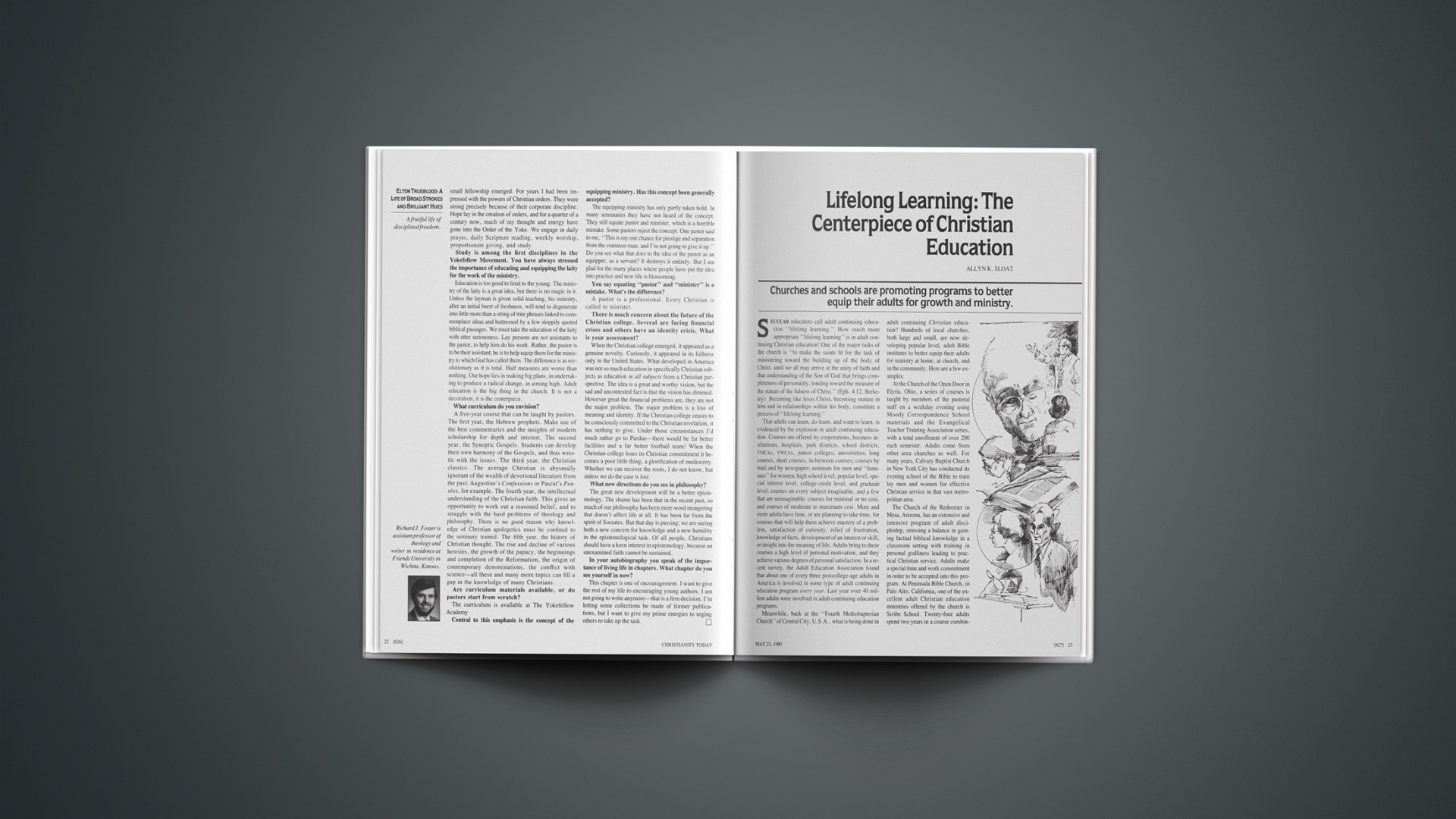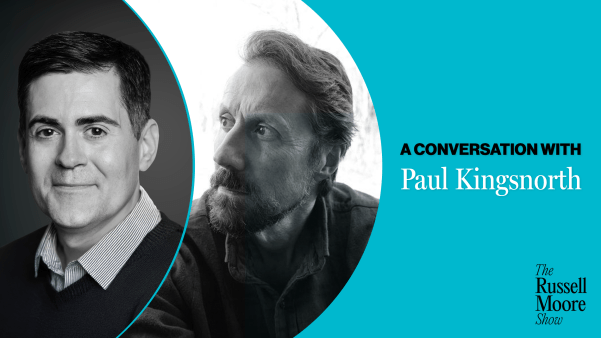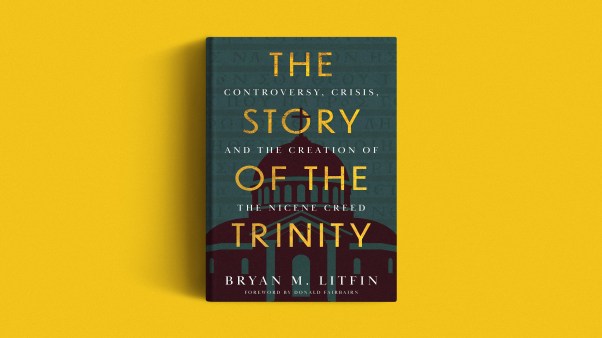Churches and schools are promoting programs to better equip their adults for growth and ministry.
Secular educators call adult continuing education “lifelong learning.” How much more appropriate “lifelong learning” is in adult continuing Christian education! One of the major tasks of the church is “to make the saints fit for the task of ministering toward the building up of the body of Christ, until we all may arrive at the unity of faith and that understanding of the Son of God that brings completeness of personality, tending toward the measure of the stature of the fulness of Christ.” (Eph. 4:12, Berkeley). Becoming like Jesus Christ, becoming mature in him and in relationships within his body, constitute a process of “lifelong learning.”
That adults can learn, do learn, and want to learn, is evidenced by the explosion in adult continuing education. Courses are offered by corporations, business institutions, hospitals, park districts, school districts, YMCAs, YWCAs, junior colleges, universities; long courses, short courses, in-between courses; courses by mail and by newspaper; seminars for men and “feminars” for women; high school level, popular level, special interest level, college-credit level, and graduate level; courses on every subject imaginable, and a few that are unimaginable; courses for minimal or no cost, and courses of moderate to maximum cost. More and more adults have time, or are planning to take time, for courses that will help them achieve mastery of a problem, satisfaction of curiosity, relief of frustration, knowledge of facts, development of an interest or skill, or insight into the meaning of life. Adults bring to these courses a high level of personal motivation, and they achieve various degrees of personal satisfaction. In a recent survey, the Adult Education Association found that about one of every three postcollege-age adults in America is involved in some type of adult continuing education program every year. Last year over 40 million adults were involved in adult continuing education programs.
Meanwhile, back at the “Fourth Methobapterian Church” of Central City, U.S.A., what is being done in adult continuing Christian education? Hundreds of local churches, both large and small, are now developing popular level, adult Bible institutes to better equip their adults for ministry at home, at church, and in the community. Here are a few examples:
At the Church of the Open Door in Elyria, Ohio, a series of courses is taught by members of the pastoral staff on a weekday evening using Moody Correspondence School materials and the Evangelical Teacher Training Association series, with a total enrollment of over 200 each semester. Adults come from other area churches as well. For many years, Calvary Baptist Church in New York City has conducted its evening school of the Bible to train lay men and women for effective Christian service in that vast metropolitan area.
The Church of the Redeemer in Mesa, Arizona, has an extensive and intensive program of adult discipleship, stressing a balance in gaining factual biblical knowledge in a classroom setting with training in personal godliness leading to practical Christian service. Adults make a special time and work commitment in order to be accepted into this program. At Peninsula Bible Church, in Palo Alto, California, one of the excellent adult Christian education ministries offered by the church is Scribe School. Twenty-four adults spend two years in a course combining classroom instruction with in-service work experience in all phases of the church’s ministry. Leadership is shared by the pastoral staff, which seeks to prepare Scribe students for local church vocational positions.
Trinity Church of Seattle, Washington, conducts its Schools of Christian Living for adults on Sunday afternoons. In the School of Counsellor Training, lay persons are trained by professional counselors to handle crisis work via the telephone. The church receives an average of 600 crisis calls per month. This program has gained public commendation by many Seattle area social agencies. A School of Creativity gives adults an opportunity to discover, develop, and improve specialized gifts in music and other artistic areas, in journalism, and in crafts. The School of Discipleship accepts 36 men and women each year for concentrated study of biblical discipleship, with research papers, exams, and evaluative grades as part of their responsibility.
Calvary Baptist Church in Grand Rapids, Michigan, has long carried on an internship training program for young adults pointed toward vocational Christian ministry. The church also conducts Deacons’ Training Seminars, which regularly draw scores of deacons from churches all over the Midwest, along with the pastors of those churches. The staff of Calvary Baptist has developed the program and curriculum for these seminars, which feature deacons training deacons. The response has been enthusiastic.
Though some of them may have peaked, specialized seminars continue to be a vital aspect of the Christian adult continuing education scene, with hundreds of programs conducted by churches, Christian schools, and organizations, and covering a multitude of topics. Most notable of the week-long and weekend seminars are “Basic Youth Conflicts” and “Walk Through the Bible.” Tens of thousands of young people and adults come to see and hear Bill Gothard in person or on videotape. They receive large, red notebooks with scriptural answers to personal and family problems from Gothard’s perspective. Alumni keep coming back (free of charge) to receive new notes and insights. “Walk Through the Bible” seminars in Old Testament, New Testament, the Gospels, the Prophets, and Bible study methods give hundreds of participants creative “memory handles” for an overview of the whole Bible and selected parts of Scripture, as well as ways to study the Bible for themselves. These seminars also provide notebook materials.
Christian liberal arts colleges, Bible colleges, and Bible institutes are expanding their adult continuing Christian education horizons. Many of these schools have conducted evening programs for many years. Some of the courses are college credit-level courses, but in recent years more and more evening programs are offering popular-level courses. Adults need to consider the difference between college credit- and popular-level courses. Here’s one way to look at it, using a course on Romans as an example: College-level credit: two-semester-hour course meeting for two classroom hours per week over a 15-week semester, for a total of 30 classroom hours of instruction. Popular-level credit: one semester hour course meeting for one classroom hour per week over a 15-week semester, for a total of 15 classroom hours of instruction.
Popular-level instruction thus provides about half the number of classroom hours of instruction that would be required for college-level credit. However, the vast majority of postcollege-age adults interested in reentering a more formal education program desire popular-level training that can be practically applied in their lives and in service for Christ in the home, church, and community. While it is very important to offer some type of certificate recognition, or even a graduation goal, most of the adults in these programs are not interested in college-level credit.
Until the last decade, institutions of higher Christian education that offered popular-level evening programs expected adults to come to their campuses one or more evenings a week for study. Now, a few of these schools are “taking the school to the people” through evening school extension ministries. The two schools doing most with evening school satellite programs are Washington (D.C.) Bible College and Moody Bible Institute of Chicago. The two differ in basic approach. Washington Bible College concentrates on the greater Washington, D.C. area, with extension schools meeting in local churches within a 50-mile radius. Moody Bible Institute, however, places its satellite evening schools in more neutral public or private secondary schools in order to appeal to a wider cross section of adults. Moody feels that meeting in a local church might limit participation by adults from other churches.
Faculty members at Washington Bible College do most of the teaching in their evening school extensions, but Moody Bible Institute uses a team of special instructors (usually qualified pastors) in each satellite area, as well as faculty from the Chicago main campus. Moody coordinates 10 schools (including the main campus program) in five states—Illinois, Indiana, Wisconsin, Ohio, and Florida—offering approximately 175 different courses each semester in Bible, doctrine, Christian education, evangelism, pastoral studies, and Christian communications. Classes are taught by more than 90 faculty members and special instructors. Total enrollment is from 1,700 to 2,000 per semester. Enrollment has jumped from 700 in 1970 to a high of over 2,000 since the first Moody Bible Institute satellite schools were established in 1972–73. Of Moody Bible Institute’s current evening schools, eight were started in other locations in the last four years.
People in various parts of the country are thinking about beginning satellite evening schools. Before starting such a plan for adult continuing education, here is a list of important questions to ask:
1. What is the population base in your area within a 25–30 mile radius?
2. What other similar adult evening Bible school programs are operating in your area? How many adults are involved? How successful are these programs?
3. What primary spiritual needs should be addressed by an evening school in your area?
4. Is there a broad, enthusiastic interest for such a program among pastors, churches, organizations, and leaders?
5. How many area churches and Christian organizations would endorse such a school by expressing in writing their positive interest?
6. How many adults would express in writing their interest in possible enrollment?
7. What neutral facilities are available that would be suitable for an adult evening school, providing central location, easy accessibility, affordability, and adequate, lighted parking?
8. What is the potential for developing a core of qualified instructors with proper academic training, vital Christian experience, and the gift of teaching?
9. Are there available representatives to serve on a local evening school steering committee?
10. What financial support is available for both initial and ongoing costs?
Most extension schools offer courses just one evening per week, 8 to 10 courses taught by four to five different teachers. The number of evenings, courses, and instructors can be increased as interest and participation increase. Students can work toward various series certificates and eventually graduate. Moody grants a Certificate of Graduation in Continuing Christian Education upon satisfactory completion of 36 semester hours of study. Some adults choose to audit the courses, but about 80 percent of those enrolled in all Moody Evening Schools are credit students. They fulfill all course requirements, take exams, write papers, and receive a course grade.
The average time from start to graduation is six years, but recently a man in his 50s graduated after having attended Moody Evening School off and on for 29 years—and he’s still attending. He believes that in just a few years, when he retires early from his secular position, God wants him to be a pastor in small, rural churches that can’t really afford a pastor. He and his wife would have sufficient retirement income to be self-supporting. Another man, an art teacher in the Chicago public school system, trusted Christ as personal Savior at about the age of 50. Shortly thereafter he was encouraged to attend Moody Evening School. He graduated in three and one-half years by taking classes two nights a week. During those years his wife and adult children also became Christians, and now he and his wife are seriously considering teaching in a mission school in Africa.
Correspondence programs on the graduate-, college-, and popular-credit levels, are also having a positive impact on adult continuing Christian education development. Moody Correspondence School (118,000 course enrollments in 1979) is the largest of a growing number of Bible correspondence schools across the U.S. and Canada that are a part of the newly organized Christian Correspondence School Association.
Never in the history of the church have we had the quantity and quality of curriculum resources available for helping adults to become equipped for life and for their “work of the ministry”—resources from denominational and independent curriculum publishers, and materials produced by campus ministry organizations such as Campus Crusade for Christ, the Navigators, and InterVarsity Christian Fellowship. More and more these resources are helping teachers to become facilitators in a “discovery/learning” approach in adult Christian education.
Evangelicals are just beginning to scratch the surface in producing videotaped Bible study and other resources for use in connection with related student textbooks and study magazines. Most available video resources follow a “head-talking, content-centered” approach, with minimal attention to the wide variety of educational techniques for adults. By far the best use of the videotape media this writer has seen is the “Bible Alive” study series on the Gospel of Matthew produced and taught by Dr. Larry Richards. This series provides excellent balance in biblical content and use of educational participatory techniques in both video and printed resources.
A recent U.S. Census Bureau report highlights some extremely significant trends for leaders in adult continuing Christian education:
• In the next decade (1980–1990) there will be significant growth in the 25–34, 35–44, and 65 and over age groups.
• In the decade 1990–2000 there will be continued growth in the 25–34, 35–44, and 65 and over age groups, with the most dramatic growth occurring in the 45–54 age group.
• Growth in children and youth age levels will proceed at a much slower rate, and, according to moderate projections, will actually decrease over the next two decades.
Without a doubt we are entering the “decades of adults.” One of the greatest challenges facing churches and schools in these decades is that of adult continuing Christian education. We must ask ourselves: What new goals must be sought? What changes must churches and educational institutions make? Are they willing to pay the price for excellence in lifelong adult learning?
Carl F. H. Henry, first editor of Christianity Today, is lecturer at large for World Vision International. An author of many books, he lives in Arlington, Virginia.










